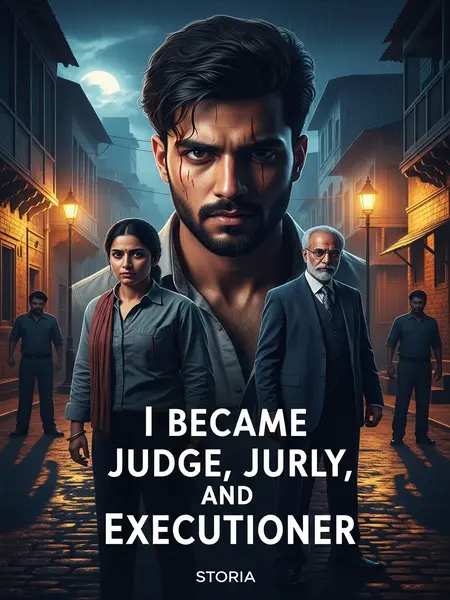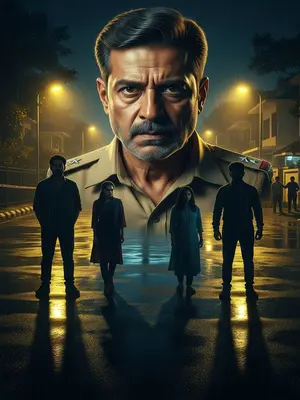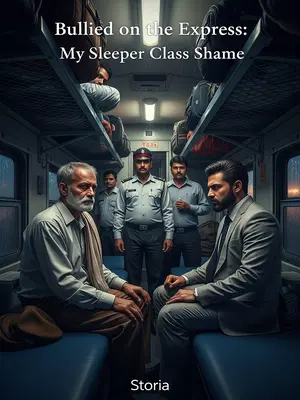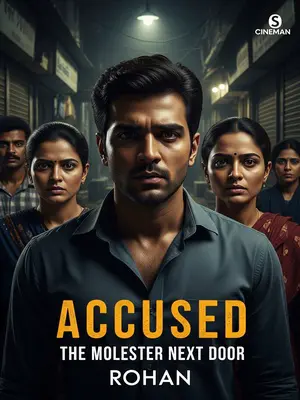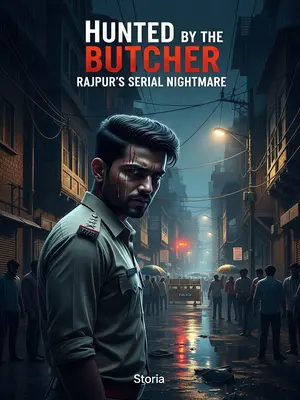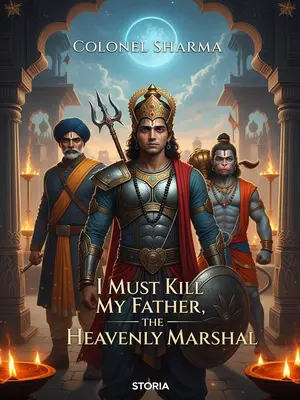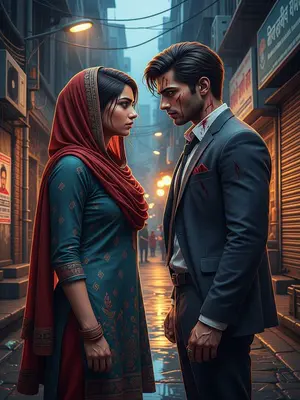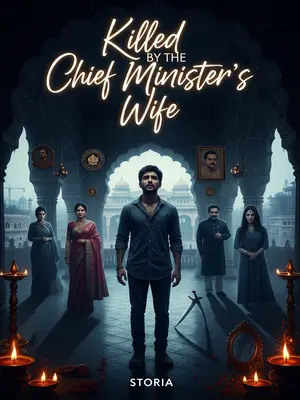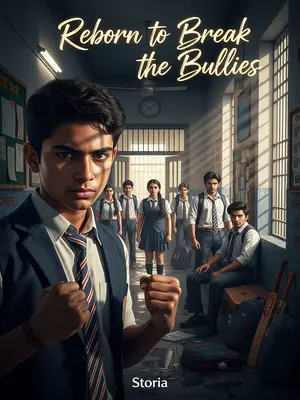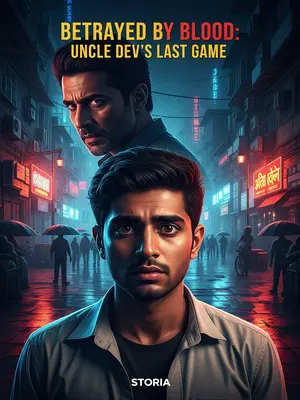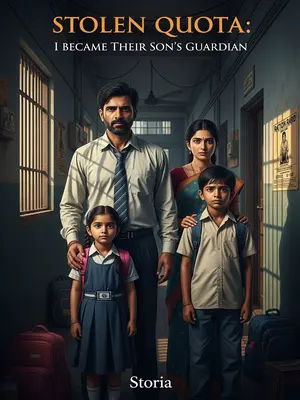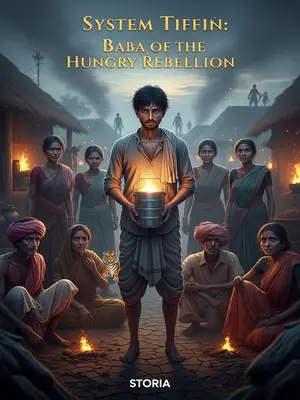Chapter 1: The Drums of Duty
The family drums thundered, and the entire Singh household mobilised in full force. My pulse matched the dhol’s rhythm—half dread, half duty.
As the dhol beats echoed through the haveli, even the household help paused, wiping their hands on faded gamchas, eyes darting towards the ancestral courtyard. Somewhere, a WhatsApp message pinged, ignored in the hush of tradition. A warm, sticky breeze carried the faint scent of incense and frying pakoras from the kitchen, but today, every member—from the youngest nephew clutching his plastic cricket bat to the greying uncles with gold chains and paan-stained teeth—stood alert, the air thick with tension and unspoken duty.
The family elder held a steel tumbler of strong desi daru, his voice stern and commanding. "Twenty years ago, two good-for-nothing boys from the local ITI stabbed a returning professor to death, nearly throwing the whole city of Kaveripur into chaos."
Aunties still crossed themselves when passing that lane, as if the memory itself could bring bad luck. The elder's heavyset frame loomed under the flickering tube light, his white kurta crumpled and chest hair peeking out. He sipped the daru with practised ease, moustache twitching, as his words landed with the weight of ancestral law. The eldest bua, sitting nearby, muttered a quiet 'Ram naam satya hai,' her knotted fingers clutching her rosary tighter as the family history resurfaced like an old wound.
"Now, twenty years later, the Singh family's ancestral council has spent a fortune to invite Professor Rohan back to India, to lead the technological reform of our three hundred and fifty family-owned factories."
From the corner, a distant cousin let out a soft whistle of awe, nudged sharply into silence by his mother. Outside, the sound of scooters revving and the distant echo of 'chai garam!' wafted in, but within these walls, the news felt monumental, charged with the pride of generations.
"But just last night, he was slapped and robbed by an ITI hooligan."
A collective gasp rippled through the hall, someone’s glass thudding to the floor. The younger cousins exchanged wide-eyed glances; the word 'hooligan' conjured up images from old Amitabh Bachchan movies. A nearby aunt clucked her tongue and whispered a fervent prayer, muttering, 'Bhagwan bachaye.'
"That rascal is underage and will be out soon. He even threatened to take revenge on Professor Rohan. Does he think the Singh family is helpless?"
The elder’s voice thundered, sending a shiver down everyone’s spine. The family’s izzat was at stake, after all—what would the neighbours say if they heard of this humiliation? Little Sarita, hiding behind her mother’s pallu, peered out, half-scared, half-thrilled by the drama.
He raised his tumbler, voice booming: "Today, we draw lots of life and death. Whoever draws it, their family will be cared for by the entire clan, their own family line established, and the family will light a diya and offer prayers to their spirit."
The elder’s words echoed with the weight of tradition. An old servant shuffled forward, arranging a brass tray with kumkum, rice, and the ancient family lots, while the flicker of diyas cast trembling shadows on the cracked marble floor. The women exchanged anxious glances, some adjusting their dupattas, others clutching mangalsutras as if for strength.
The family elder lifted his tumbler and shouted: "Protect the Singh family for generations!"
The shout reverberated through the ancestral courtyard, bouncing off old family portraits. Even the crows on the neem tree outside seemed to fall silent, as if the entire mohalla paused to listen. A distant child burst into tears, hushed swiftly by her mother’s hurried lullaby.
We all raised our glasses.
The clinking of steel tumblers rang out like a promise. Some hands trembled; others gripped their glasses with determination. An uncle muttered 'Jai Singh parivaar,' and the chorus built, rising from deep in every chest.
Three thousand strong men of the Singh family roared, their voices shaking the heavens: "Finish them!"
It wasn’t just a roar—it was a storm. The old women watching from the balcony exchanged knowing nods. Somewhere in the back, a cousin captured the moment on his phone, already imagining the story spreading through WhatsApp groups and local Facebook pages.
The desi daru was downed in one gulp.
Spirits burned all the way down, making eyes water and faces flush. A few men coughed, pounding their chests, but nobody dared lag behind. The atmosphere was heady, electric with conviction and the raw edge of impending violence.
Only at the bottom of my glass were the words: "life and death."
I stared at the script, hands slick with sweat. My cousin’s gaze bored into me, daring me to back down. I swallowed, the taste of daru and fear burning my tongue. The moment felt heavy, as if the ancestors themselves watched from the smoky rafters. My breath came slow and tight, heart thudding louder than the drums outside.
I smashed the glass. All eyes turned to me.
The sound of shattering steel startled even the bravest; silence fell. Eyes darted between me and the elder, the unspoken question hovering: who would take up the burden?
I wiped the liquor from my lips and turned to leave.
My hand trembled as I brushed away the fiery liquid, jaw clenched in quiet resolve. Behind me, someone whispered my name—my mother’s voice, breaking—but I kept my back straight, each step echoing off stone like a drumbeat of fate.
"From today on, the ancestral hall will light a diya for my spirit."
The words left my lips like a prayer and a curse all at once. An old cousin pressed her hands together, murmuring 'Om shanti.' The family priest, seated near the entrance, gave a solemn nod, already picturing the new diya flickering by the portraits of martyrs past.
I have never believed that all lives are equal. Some people are as weighty as the Himalayas, others as light as dust.
The air in the room thickened, as if centuries of Singh pride pressed down on my shoulders. My grandfather’s cane, leaning against the ancestral throne, seemed to glow in approval. Outside, the first monsoon thunder cracked—an omen, perhaps.
Professor Rohan is as weighty as the Himalayas—a peerless national talent.
His name alone carried respect in every home from here to Delhi, his reputation woven into the tapestry of Kaveripur’s own destiny. Even the local MLA had come for his welcome, touching his feet with reverence. In our hearts, he was no less than a jewel in Bharat’s crown.
He gave up a crore-rupee salary to return and build the country’s industry. In my heart, he is truly an irreplaceable treasure of the nation.
Who does that these days? Every parent in the mohalla whispered his story to their children, urging them to dream big but never forget their roots. My mother often said, ‘Beta, learn from Rohan bhaiya—he’s made the whole city proud.’
I still remember how kind Professor Rohan was. He never put on airs. He shyly asked me to help him set up PayTM, marvelling at how advanced the country had become—no need for cash, just scan your face or phone to pay.
That day, he’d laughed, scratching his head, admitting, 'Technology is running faster than my old bones.' Even as I guided him through the app, he kept looking around with wonder, pointing out the speed of QR codes at even the smallest paan shop. His humility was infectious, a rare thing among such educated people.
He patted my shoulder, saying he was delighted to be back in time, and had discovered many problems in our factory area.
He spoke in chaste Hindi, peppered with the odd English word, eyes bright as he described his plans. 'We can fix the boilers, improve ventilation—workers should not suffer in this heat, yaar.' His hand lingered on my shoulder, a gesture of trust that warmed me more than any summer sun.
But his injury is connected to me.
The thought stung deep, like the bite of a thousand ants. My chest felt hollow; my mother’s face flashed in my mind, worry lines etched deep. The air in my room was heavy, as if the ceiling fan above spun only to stir up regret.
It’s all my fault. I was busy delivering equipment to the family’s factory, and we agreed I’d help him set up PayTM after my holiday.
I replayed our conversation—his patient nod, my hurried promise—wishing I’d dropped everything that very minute. How could I have known fate was listening, waiting to teach me a lesson?
If not for me, Professor Rohan wouldn’t have had to pay with cash, and wouldn’t have been targeted by that goon.
The image haunted me: his gentle smile at the Maggi stall, wallet out, unaware of danger lurking in the shadows. In my head, I scolded myself a hundred times over. 'What’s the use of strength if you can’t protect your own?' I muttered, knuckles white with shame.
And that goon?
I spat on the floor, cursing under my breath. For a moment, all I could hear was the rattle of rickshaw bells outside, mocking me with their indifference. ‘Such people are a stain on Kaveripur,’ I thought, my anger a slow-burning coal.
